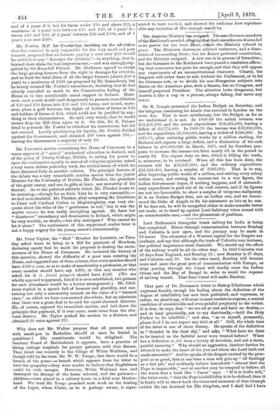Sir R. Temple presented the Indian Budget on Saturday, and
the telegram containing its details was received in London on the same day. That is most satisfactory, but the Budget, as far as we understand it, is not. In 1868-69 the actual revenue was £51,657,600, and the actual expenditure £54,431,000, leaving a deficit of £2,774,000. In 1869-70 the income was £52,942,000, and the expenditure 53,568,000, leaving a deficit of £626,000. In 1870-71, after reducing public works by a million stealing, Sir Richard still expects a large deficit, and a diminution of his cash balance to £10,000,000 in March, 1871, and he therefore pro- poses to increase the income-tax from nearly 4d. in the pound to nearly 8d. The export duty on rice, which is killing the trade, is, moreover, to be retained. When all this has been done, the revenue will be £52,327,000, and the ordinary expenditure 152,164,000, leaving a surplus of £163,000. That is to say, after depriving public works of a million, and cutting every salary within reach, and raising the income-tax to a war figure, the Indian Government hopes, if nothing happens, and if extraordi- nary expenditure is paid out of its cash reserve, and if its figures are not too favourable, to show a surplus of twopence-halfpenny. It is an Italian Budget that, not an Indian one, and we recom- mend the Duke of Argyle to fix his statement as late as he can. If he does not, he will be compelled either to make remarks better not made, or to stand up against Lord Salisbury when armed with an unanswerable case,—not the pleasantest of positions.


































 Previous page
Previous page